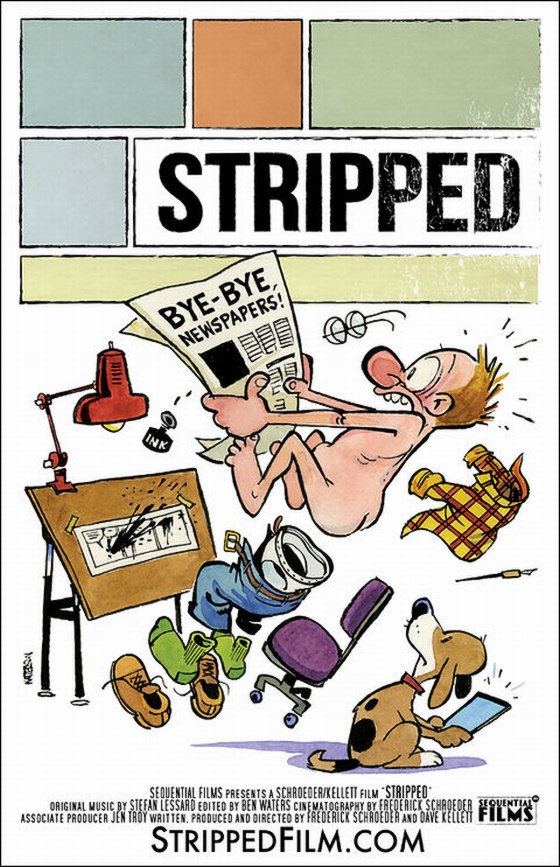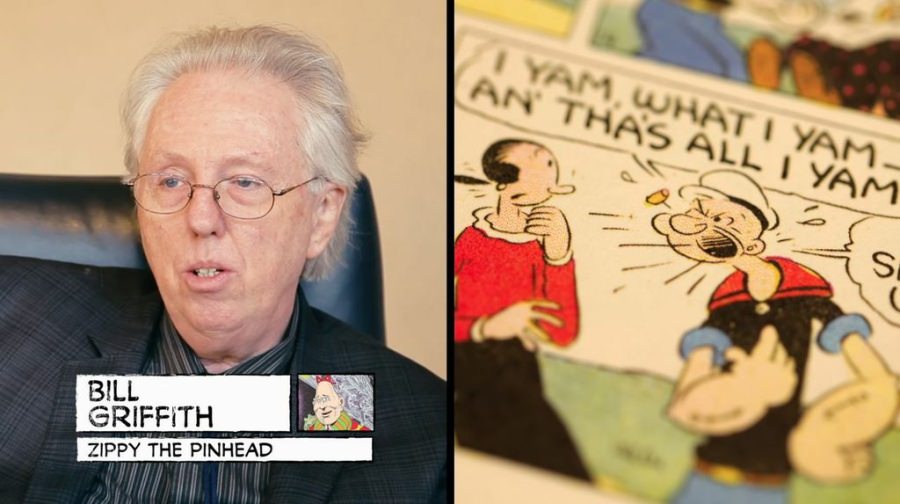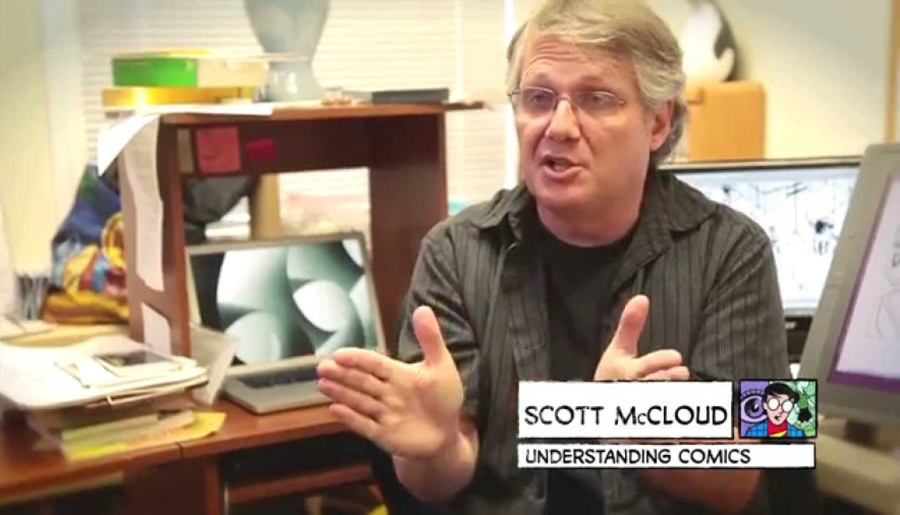Stripped
Directed by Dave Kellett and Frederick Schroeder (2014) ***
 The documentary Stripped attempts to shine light on the art of comic strips — their history, present and future, how they’re created and how they’re marketed and how they’re distributed — in a very short 85 minutes. That’s an impossible task. All cartoonist Dave Kellett (creator of the strip Sheldon) and filmmaker Frederick Schroeder can hope to really do is skim the surface of the subject matter, but they are helped by some of the best creators working, and some not: the extremely reclusive, retired and private Bill Watterson (Calvin and Hobbes) not only recorded some thoughts on the medium for the film (his voice recorded for the public for the first time), but also designed the film poster.
The documentary Stripped attempts to shine light on the art of comic strips — their history, present and future, how they’re created and how they’re marketed and how they’re distributed — in a very short 85 minutes. That’s an impossible task. All cartoonist Dave Kellett (creator of the strip Sheldon) and filmmaker Frederick Schroeder can hope to really do is skim the surface of the subject matter, but they are helped by some of the best creators working, and some not: the extremely reclusive, retired and private Bill Watterson (Calvin and Hobbes) not only recorded some thoughts on the medium for the film (his voice recorded for the public for the first time), but also designed the film poster.
Stripped was made when the main longtime medium of comic strip delivery, the daily newspaper, was in crisis (it still is). Where once masters of cartooning were allowed an entire page for amazingly detailed art (George Herriman’s Krazy Kat, Hal Foster’s Prince Valiant, Winsor McCay’s Little Nemo), strips in the latter part of the 20th century were forced by editorial decree to print in ever smaller sizes, to the point that it’s now virtually impossible to tell an in-depth serialized story in the papers. As Stripped observes, most large towns used to have two major competing papers, which would vie for the best new strips and publish ones the other didn’t. Now, some large cities have no printed newspaper at all. A profession, writing and drawing comic strips, which used to be extremely difficult to enter, is now nearly dead.
In some ways helping to speed the demise of demand for newspapers and in other ways a boon for adventurous comic strip artists, the internet is the de facto new medium for strips. The comic strip syndicates, pioneered by giants of industry like William Randolph Hearst, were analogous to the 20th century record labels; distributing the work for the artists, taking ownership of all business matters, including marketing, financially rewarding the artists who sold well, practically leaving in the poorhouse those who didn’t.  Self-marketing by posting cartooning on the internet for practically free does cut out the middleman (the syndicates), but it’s, of course, a long hard, arduous process to attempt to draw an audience which may never appear.
Self-marketing by posting cartooning on the internet for practically free does cut out the middleman (the syndicates), but it’s, of course, a long hard, arduous process to attempt to draw an audience which may never appear.
Stripped spends much time with cartoonists Bill Amend (FoxTrot), Cathy Guisewite (Cathy), the late Mort Walker (Beetle Bailey), the late Richard Thompson (Cul de Sac), Kate Beaton (Hark! A Vagrant),and Jerry Holkins and Mike Krahulik (Penny Arcade), to name a few. All interviewed seem somehow surprised they managed to forge a career doing something they love to do, though the long hours and constant pressure to be creative every single day isn’t overlooked. The fast-moving film conveys both the joy of reading and the joy of creating comics.
One odd aspect of the overview which even the casual observer will note (and the film doesn’t address) is that most of the 2014 examples shown of web comics look amateurish, unskilled and unaccomplished compared to examples shown from the golden age of the medium. Even the choices of subject matter seem diminished. Whereas the most famous of the classic comic strip artists were often the cream of the crop in drawing ability, writing, pacing and plain, simple storytelling, those no longer seem the attributes which result in or lay the foundation for success in today’s online comics market. Naturally, it’s hard to argue with financial success and there are many magnificent examples of visionary, groundbreaking web comics. You wouldn’t know it, though, from watching Stripped.  Provocateur Scott McCloud is shown on camera saying that compared to webcomics the old delivery system (newspapers) looks barbaric, but from what we see, the opposite is true.
Provocateur Scott McCloud is shown on camera saying that compared to webcomics the old delivery system (newspapers) looks barbaric, but from what we see, the opposite is true.
Stripped also interviews historian R.C. Harvey (whose definitive biography of Milton Caniff, Meanwhile…, is highly recommended), Jean Schulz, the widow of Charles Schulz (Peanuts), Jeff Keane (The Family Circus), Jim Davis (Garfield), Stephan Pastis (Pearls Before Swine), as well as syndicate editors, museum curators and investors.
Who is Stripped for? Those who have little interest in comic strips, which some may think is a dead art form, will have little incentive to seek out and watch the film, while those who love the art form or are practitioners of it (like myself) will learn little from such a short and cursory overview. As a document of a precarious time, however, when traditional media and new media had and have an awkward, sparring embrace, it’s a time capsule worth preserving.
—Michael R. Neno, 2020 June 9